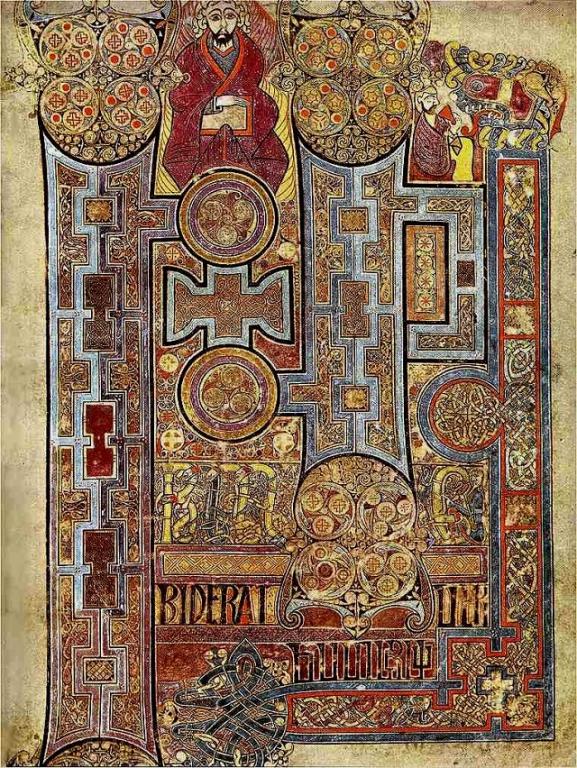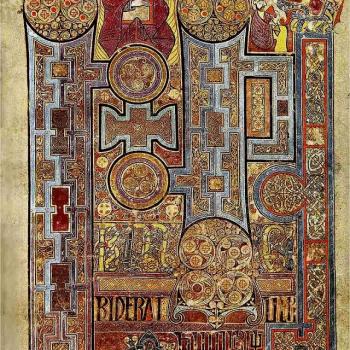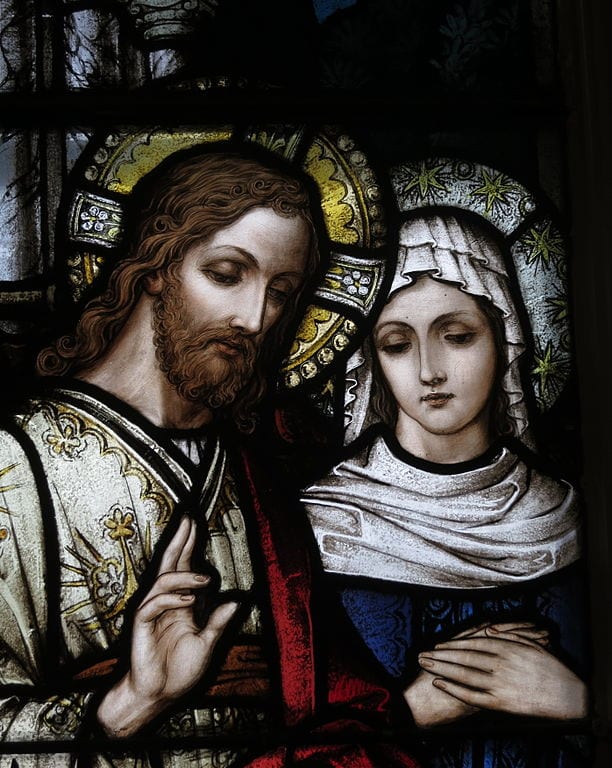
Ann, an atheist, commented on my article, Golden Calf & Cherubim: Biblical Contradiction? (11-23-20, vs. Dr. Steven DiMattei), and we got into a serious exchange (though never — by my definition — a true dialogue). Her words (complete from my blog) will be in blue.
*****
This article is a good example of the difference between “Biblical scholarship” (Dr. Steven DiMattei) and “Bible study” (Dave Armstrong.)
“Bible study” tries to prove that its assertions about the meaning of a Bible passage can be proved correct by pointing to another Bible passage.
It takes it for granted that the words of the Bible are factually true, historically spoken, and it just wants to defend one particular interpretation.
“Biblical scholarship” seeks to uncover the origins of the Bible passage and how it demonstrates “the way the contemporary people were thinking.”
There is no special idea that the assertions of the Bible are literally true or describe actual historical events.
Instead, Biblical scholarship sees the passage as a reflection of the historical evolution, the thoughts, the concepts, the philosophy of the people who wrote it.
DiMattei and Armstrong are talking past each other.
It’s a long discussion. You pass over the many internal inconsistencies I point out in his work, and questions about the arbitrary assertions he makes. Since he won’t respond (what a surprise), of course we will be talking past each other. It’s his choice, not mine. I’m confident in my positions; he seems not to be confident in his positions. I’m all in favor of dialogue. Most folks today are not. They want to preach to the choir.
I think there is still something you are not recognizing.
DiMattei does not have a “position” in the way that you do.
He is not preaching for the adoption of his point of view.
Instead, biblical scholarship lays out its research findings among ancient documents as we have them so far.
Then a scholar deduces what the historical significance of those findings may be.
He then presents his deductions to the wider community of fellow scholars in order to introduce this new concept.
These results are necessarily always tentative because more documentary evidence may materialize in the future, or a better scholar may interpret the ones we already have with more learning or a more subtle historical understanding.
In your case, you have come to a conclusion about what God means, and your support is in other parts of the Bible.
New information will not be added in the future, unlike the resources of Biblical scholarship.
Your conclusions are not based on “evidence” — only on “argument.”
There are “many internal inconsistencies” in his work — and that is fine with him — because the documentary evidence he is relying on makes inconsistent claims, which he incorporates into his historical analysis.
He isn’t “preaching” like you are — trying to convince others that (based on the Bible itself), your reading of the words of the Bible is the one God intends.
DiMattei is simply laying out the contents of the documents (in the Bible and elsewhere) that he has researched so far, and describing to other scholars his suggestions about what they they signify historically.
You are talking past each other, not because he does not respond, but because you two are talking about two different topics.
He doesn’t have “believers,” or True Believers™ , or followers.
He has fellow scholars who share or don’t share his proposed suggestions about what the evidence shows so far about what the people of those times used to think and believe.
It’s liberal / skeptical “biblical” scholarship — not the entirety of “biblical scholarship” and its goal is to try to prove that the Bible is not inspired revelation at all, but rather, merely a human document like any other. Those of us who are Christians do not believe that to be the case. But it’s not simply “blind faith” (the liberal caricature of belief) but rather, faith + evidence in a host of ways, in many fields.
If you claim his goal is not to “tear down” the Bible, then tell me: why the extreme emphasis on supposed “contradictions” in the Bible? Why is that so super-important, and where else do we find such efforts? When I refute these, I’m not simply appealing to blind faith. I show internal logical contradictions, which rather defeats his purpose: his attempts at making the Bible contradict itself in every other sentence leads to himself doing so.
Logic is something we can all agree on. He (and many others of his ilk: like Bob Seidensticker, whom I have refuted 65 times, and Dr. David Madison: another 50 or so) have no interest in dialogue because they are not (in my opinion) honest, objective thinkers. If they were serious thinkers, they would grapple with critiques just as all thinkers do. I love to receive serious critiques. I wish I received a ton more than I do.
Rather, they are mere propagandists.
If Dr. DiMattei is such a renowned scholar, where is he teaching now? Where are his articles in peer-reviewed journals? They may exist, but he seems to give no information about them. Does he have more than one book published?
I don’t know this particular person at all, so I am speaking about “Biblical scholarship” as it is distinct from “Bible study.”
Biblical scholarship does not have any “goal” at all — never mind a “goal to try to prove that the Bible is not inspired revelation … but merely a human document like any other.”
Biblical scholarship TAKES IT FOR GRANTED that the Bible actually is merely a human document like any other, and study it (and the preceding legends and myths that it is based on) as an historical phenomenon with historical interest but irrelevant in its religious claims.
The reason that Biblical scholars take it for granted that the Bible is merely a human document like any other is that they study the actual early versions of the myths and legends preceding the versions in the Bible.
We can find exactly similar historical evolution of other kinds of human documents — early versions of fairy tales (and their morphing into the current versions), early developments of Arthurian legends, previous sources of Shakespeare’s plots, early (and increasingly refined) versions of maps …
(Finding early maps as they evolved accuracy is interesting to scholars because it helps locate the dates and places of, for example, expeditionary armies, who return with improved information, thus suddenly changing the maps.)
Naturally if you believe that the Bible is a unique document emanating from an infallible source, you will misperceive the goals of people who blandly refer to documents that contradict your beliefs (such as previous versions of a Bible story in Sumerian documents.)
The interest on the contradictions and errors in the Bible is not an attack on its supernatural origins.
Because they are so familiar with its human origins, no Biblical scholar imagines for a moment that it even had a supernatural origin.
Instead, contradictions and revisions are used as evidence of the historical evolution of the fables of the Bible and how and why they assumed their present form.
For example. the contradictory comments about the spherical nature of the earth are revealing.
Bible passages that know that the earth is a sphere indicate that the author had a Greek education because the Greeks had already discovered that (and even measured the size of the globe.)
Other passages that do not know that the earth is a globe demonstrate that these authors did not have the benefit of a Greek education.
This information is useful in helping the scholars locate the composition of the passage in time and place.
Another example is the story of the walls of Jericho, which was in ruins for centuries before the earliest date the Bible story could have been written.
I am well aware of the nature of liberal / skeptical biblical scholarship. I’ve dealt with it for forty years. It’s you and I who are talking past each other. Steven and I are not because I am talking and he isn’t.
I could write a great deal about conservative / orthodox biblical scholarship and address the many bum raps you have thrown out, but I’m more interested in Steven’s case and his defense of it. With most of the critiques I have made, it matters not if I am a three-toed, green-eyed Rastafarian or an Indian shaman or a Taoist or Buddhist. My critiques deal with internal contradictions in his presentation.
Let me give you an example from another of my recent critiques of Steven’s arguments:
God in Heaven & in His Temple: Contradiction?:
He claimed:
the Deuteronomists would have vehemently disagreed with the Priestly writer’s ideology that Yahweh dwelt among the people. For the Deuteronomist, Yahweh dwelt in heaven. To preserve the holiness of the Temple dwelling, the Deuteronomist claimed that merely Yahweh’s name resided there, not his glory nor presence . . .
I then provided 15 passages from Deuteronomy: all of which contradicted his claim above. Then I wrote about what this would force him to do, to salvage his theory:
He is forced now to say, “well, those are simply non-Deuteronomist portions later added to the book of Deuteronomy . . .” It’s the “answer” to everything (hostile or contrary interpolated texts). But when a particular ploy or theory or fiction is used for every conceivable difficulty, it is soon seen that it is in fact the solution of no difficulty. A thing can explain too much as well as too little. It’s just not plausible. It’s on the level of a conspiracy theory.
This is just one of many problems and difficulties I have raised that Steven — if he is a thinker confident of his convictions — would have to grapple with. He refuses. Those who are of his general opinion almost always refuse to address criticisms. In the case of one guy recently, who writes at the same site I do (Patheos), he threatened to sue me because I critiqued him three or four times.
Nothing you say ameliorates his intellectual duty to address such criticisms.
Most proposed biblical “contradictions” are not at all, by the laws of logic: not some “fundamentalist” prior objection. They don’t hold water. I have dealt with scores and scores of them. You raise a few yourself and bring up other misconceptions. Conservative Bible scholars who accept biblical inspiration are not averse at all to discussing elements of prior stories from regions near Israel that seem similar to biblical ones. One look at my large personal library would quickly disabuse you of that notion. I’ve written (or hosted) several papers that discuss how Christianity “baptizes” many non-Christian beliefs and customs and incorporates them into its beliefs (as did Judaism before it):
Is Catholicism Half-Pagan? [1999]
Is Easter Pagan & the Word a “Pagan Compromise”? [1999]
Halloween Joys & the “Baptizing” of Pagan Customs (Guest Post by Rod Bennett and Mark Shea) [11-1-06; expanded on 10-31-16]
Is Catholicism Half-Pagan, & a Blend of Gospel & Lies? [2007]
You say the Bible teaches a spherical earth in some places and a flat earth in others. This is simply untrue. It doesn’t teach a flat earth at all:
Biblical Flat Earth (?) Cosmology: Dialogue w Atheist (vs. Matthew Green) [9-11-06]
Flat Earth: Biblical Teaching? (vs. Ed Babinski) [9-17-06]
It simply doesn’t teach it. One can be an orthodox Christian like myself or an atheist or anything else, and understand that this is the case: provided they actually study Hebrew culture, how the ancient Hebrews thought and reasoned, and some of the words involved. We are just as interested in finding out what the Bible actually teaches, as the skeptics are (if not more so).
You say (or imply) we are biased and unable to be trusted because we believe in biblical inspiration. That’s like saying that Einstein was biased when writing about relativity because he believed in it, or Newton about gravity or Copernicus about heliocentrism (which is almost as false as geocentrism because the sun isn’t the center of the universe, either), or Madame Curie about radioactivity: because they all firmly believed in those things.
We can just as rightly show that many proposed biblical contradictions are not at all, and that many skeptical claims about what the Bible teaches are equally false and invalid, due to various degrees of illogic, non-factuality, or unfamiliarity with the biblical worldview and proper biblical exegesis and hermeneutics, or various other false premises or wrong turns in reasoning chains.
Bottom line: I have provided plenty of legitimate, serious criticisms of Steven’s work. He ignores them. I let him know that I made them (if he even checks his Twitter page). Instead, you are here defending his general enterprise of biblical skepticism. I enjoy talking with you, but he has the duty to defend his own views, too. If he can’t, then they aren’t worth much: whatever one might be inclined to think of them.
Did you ever notice the “throw-away” bits in The Terminator which demonstrate that dogs recognize Terminators and hate them?
There’s the scene where John and the Terminator call his foster home and hear his dog going ape in the background because a bad Terminator is in his house.
There’s a quick shot of the soldiers in the bunker with a pair of German Shepherds as allies in the fight against Terminators.
There’s the scene where the Terminator is approaching the motel cabin where Sarah is hiding out and a wee little dog is in hysterics barking at the Terminator’s foot (bigger than the whole dog.)
——————–
And here is a scenario that I invented, so please forgive me for not knowing anything about physical geodesy.
Let us imagine that a research post-doc got access to some ultra high accuracy images of earth taken from the ISS.
Following a long effort of the most painstaking precision, he discovers something new about the dimensions of the planet.
(As you many know, earth is not a perfect sphere. It is an “oblate spheroid” for some reason known to the experts.)
In my imaginary story, the researcher is excited because his studies demonstrate that one of the measurements commonly used is actually incorrect by 87 km ± 3 km, and he publishes his findings in a professional journal.
——————–
Now the Terminator is way cooler than I am, so when he got yapped at by a wee little doggie, he didn’t even notice.
Now me — I would have noticed and been amused.
That’s how I imagine the scientist would feel if he was berated by a Flat Earther who conceived of the scientific research paper as an attack on the cult of a Flat Earth — surprised and faintly amused. Not amused enough to respond to the charge that his work was invalidated because it is only withing a tolerance of 3 km, but briefly amusing anyway before he moved on with his science and forgot all about the challenge from the Supernatural realm.
—————–
Your pious beliefs refer to things that are not objectively, empirically, demonstrably true.
In fact, they are objectively, empirically, demonstrably untrue.
Researchers in the area of the dissemination of ancient myths might be interested in tracing the development, the evolution, the spread of the THREE stories of the parting of the waters (Moses, Elijah, Elisha).
Maybe they are interested in the meaning, the reason for writing the two irreconcilable genealogies of Jesus, the point they ancient writers were making.
But the concept that these myths have demonstrable, empirical, objective antecedents cannot be denied.
The evidence exists as physical objects that you can hold in your hand.
Being a “life-long atheist”, it comes as no surprise to me that you take the positions you do. So, for example, obviously you can’t believe the Bible is an inspired infallible revelation from God because there is no God there to form a necessary piece of that puzzle. You may say that causes no bias in you, but it does form a premise that is in stark opposition to the premises I start with — due to reasoning (existence of God; thus the possibility of revelation from Him).
That being the case, you obviously have to adopt by default a position whereby the Bible is not a whit different from any other ancient literature. Ah, but it is massively different, as I have shown in many articles, and many other Christian apologists, theologians, archaeologists, and historians have shown in hundreds of ways.
Here is but one example of many from my paper, Seidensticker Folly #59: Medieval Hospitals & Medicine:
Hippocrates, the pagan Greek “father of medicine” didn’t understand the causes of contagious disease. Nor did medical science until the 19th century. But the hygienic principles that would have prevented the spread of such diseases were in the Bible: in the Laws of Moses. . . .
Hippocrates, the “father of medicine” (born 460 BC), thought “bad air” from swampy areas was the cause of disease.
Mosaic Law and Hebrew hygienic practices, dating as far back as some 800 years before Hippocrates, were far more advanced:
1. The Bible contained instructions for the Israelites to wash their bodies and clothes in running water if they had a discharge, came in contact with someone else’s discharge, or had touched a dead body. They were also instructed about objects that had come into contact with dead things, and about purifying items with an unknown history with either fire or running water. They were also taught to bury human waste outside the camp, and to burn animal waste (Num 19:3-22; Lev. 11:1-47; 15:1-33; Deut 23:12).
2. Leviticus 13 and 14 mention leprosy on walls and on garments. Leprosy is a bacterial disease, and can survive for three weeks or longer apart from the human body. Thus, God commanded that the garments of leprosy victims should be burned (Lev 13:52).
3. It was not until 1873 that leprosy was shown to be an infectious disease rather than hereditary. Of course, the laws of Moses already were aware of that (Lev 13, 14, 22; Num 19:20). It contains instructions about quarantine and about quarantined persons needing to thoroughly shave and wash. Priests who cared for them also were instructed to change their clothes and wash thoroughly. The Israelites were the only culture to practice quarantine until the 19th century, when medical advances discovered the biblical medical principles and practices.
The Bible is no different from any other ancient document? This is but one example. To show that the Bible is not unique here, you would have to show other ancient cultures that had such an in-depth understanding of hygiene and contagious disease. Good luck.
The same sort of thing occurs in many areas: whether it is the sophisticated biblical understanding of creation (ex nihilo) compared to Greek mythology et al, or the spherical earth, or timelessness, etc. The Big Bang theory finally caught up with the biblical teaching of an earth created out of nothing in the 20th century: and that was first introduced by a Catholic priest!
Your pious beliefs refer to things that are not objectively, empirically, demonstrably true. In fact, they are objectively, empirically, demonstrably untrue.
This is a bald assertion; not an argument. If you wish to refute my papers on how the Bible doesn’t teach a flat earth, feel free. If not, mere statements do not sway me because I have actually studied the issue in some depth.
I dealt with the “contradictory genealogies” claim over against atheist JMS Pearce three years ago:
Again, if you wish to dissuade me you’ll have to get into the thick and thin of it and actually interact with my arguments. Bald statements don’t cut it with me. They prove nothing.
Dave, it is my fault that I am not making myself clear.
1) The assertion that the Bible full of claims and anecdotes that are not true is not a BALD assertion.
It is an assertion that is demonstrated with hard physical EVIDENCE.
2) My anecdote about a Flat Earth was intended as an analogy — not an accusation that you believe in a flat earth.
Nevertheless, there are some passages in the Bible that do demonstrate a knowledge that the earth is a sphere, and some passages that show the writer thought the earth was flat.
But it’s silly to get hung up on this error to prove that the Bible is choked full of errors and self-contradictions when there is sooo much low-hanging fruit.
3) I don’t know what you mean by “dealt with” the contradictory genealogies claim, but you certainly did not dissolve the problem by trying to show that it follows the genealogy through the female line or some such thing as that.
If nothing else (and there is a lot else), the very NUMBER OF GENERATIONS cannot be reconciled.
3) You’re correct to point out that “bald statements” prove nothing.
You just don’t admit that ARGUMENTS don’t prove anything either.
Any fool can “prove” anything he wants with “argument.”
That’s why it is not allowed in a court of law.
The only thing that demonstrates anything is EVIDENCE.
4) I don’t want to get into a debate with you that I have been through hundreds of times.
My only interest in posting here is the one I stated in the beginning:
> You are using “Bible study” ARGUMENTS to try to defeat “Biblical scholarship” EVIDENCE.
You say in effect, “When the Bible says XYZ, it means “myXmyYmyZ”, and I know that this is the true interpretation because the Bible says so.”
Biblical scholarship says “This legend originated in Babylon, and here is the physical evidence that shows it.”
I’m puzzled that you’re unable to see the difference.
You’re just repeating yourself now (over and over) and deliberately avoiding any direct interaction with my arguments (which of course include much evidence) so we’re done. I take a very dim view of engaging in exchanges which are not dialogues at all, but mutual monologues. I dialogue, and this is no dialogue.
***
Photo credit: Book of Kells (c. 800), Folio 292r, Incipit to John [public domain / Wikimedia Commons]
***


























